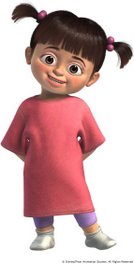Most children form deep, loving bonds with their parents and friends from a very early age. Any adoptive parent will tell you, biology is only part of the love story. Young babies bond emotionally with people who give them regular care and affection. In fact, the first step in ensuring that your baby will bond with others is to attend to his needs in a timely fashion and let him know that she's loved. A baby is dependent on caregivers for everything from nourishment to safety, so her initial bond is very strong, explains D'Arcy Lyness, PhD, a child psychologist and psychology editor for KidsHealth.org. It also sets the standard for what a baby expects in later relationships in terms of emotional security, trust, and predictability.
Even though the baby does feel secure in the womb and can feel and hear the outside environment to an extent...it's not just biology that makes the child the person they will be.
Tuesday, April 24, 2007
I read an article recentlyI found very good about teaching a baby about love...
Subscribe to:
Post Comments (Atom)

3 comments:
This made me think of that terrible book "Baby Wise". The book is overly concerned with letting your baby know who is boss. Well meaning parents who have followed the principals in the book ended up with babies with failure to thrive.
Kime
I think this writer is mixing up bonding and attachment. Two separate entities.
From the Webster dictonary:
Bonding:
to form a close relationship especially through frequent association (the new mother bonded with her child)
From Healthofchildren.com:
Bonding is the formation of a mutual emotional and psychological closeness between parents (or primary caregivers) and their newborn child. Babies usually bond with their parents in the minutes, hours, or days following birth.Bonding and attachment are terms that describe the affectional relationships between parents and the infants.
.
Bonding and attachment happen after birth....with the parent who has them. This is one reason why infant adoption is better for the child.
Post a Comment